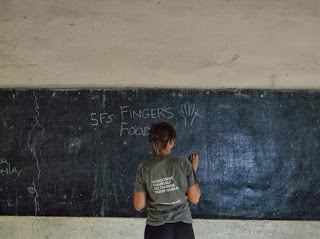 |
| The SWASH club that was set up in the Primary School |
We planned and gave 4 awareness raising sessions – 2 in the Secondary
school and 2 in the Primary school. They revolved around the importance of
washing your hands and preventing the spread of diseases. We taught them a song
that we had made (actions included) about when to wash your hands, which we
continued to hear the children sing up until the day we left.
We tried to raise awareness in fun ways! My favourite was when glitter was involved. We (the volunteers) had a handful of glitter and we stood in a huge circle with the children in between us to play a game. The aim of the game was to go round the circle, counting from one to ten, or moja to kumi in our case. As you said a number you brought your right hand over to your left side to clap the next person’s hand. When you reached kumi you had to clap the next person’s hand before they moved it away. Whoever won stayed in the game and the other person went into the middle. The glitter spread onto the children’s hands which led to the comparison with the spreading of germs. Therefore, it is important to wash your hands to prevent the spreading of germs and consequently diseases.
 |
| Drawing the 5 F's on the blackboard |
Alongside this, we also taught them about the 5 F’s – Food,
Fingers, Fields, Fluid and Flies – which explain in more detail about how bacteria
is spread. In a non-scientific explanation, if one of the 5 F’s (eg. Food) is
contaminated and unclean, then it leads to the possibility of the person who
has been into contact with it contracting a disease.
Hopefully, the things that we taught them will prevent them
from getting diseases in their future!









